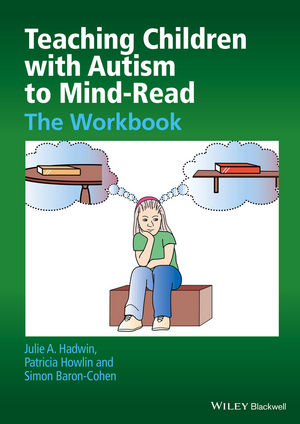Teaching Children with Autism to Mind-Read: The WorkbookISBN: 978-0-470-09324-5
Paperback
160 pages
February 2015, Wiley-Blackwell
 This is a Print-on-Demand title. It will be printed specifically to fill your order. Please allow an additional 10-15 days delivery time. The book is not returnable.
|
||||||
“Overall, I think this book would be helpful for any professional working with younger children (around 4-12 years) who are on the Autism Spectrum, in developing their social skills through using theory of mind.” (ACAMH, 26 March2015)
‘Without being aware of it we all continuously attribute mental states, such as desires and beliefs, to other people, and in this way we predict what they are going to do next. This is what children and adults with autism cannot do spontaneously. But, years of painstaking research has shown that they can be taught to do it. Clearly, this does not turn them into spontaneous mentalisers, but it does benefit their understanding of the otherwise unpredictable social world.‘In their scholarly introduction to the book the authors review an impressive number of training studies using different types of teaching aids. Informed by scientific evidence, and without any hype, they offer the best of these in The Workbook. It contains teaching aids in picture and story form that are bound to inspire teachers. The general approach is to build up a sequence of skills in line with the sequence observed in typical development; from joint attention, to pretend play, to perspective taking, to understanding emotions, desire and more complex informational mental states such as knowledge and ignorance, and finally complex second order beliefs (eg: “he thinks that she believes he is telling the truth”). It is with these complex mental states that the new workbook has expanded most over the previous one.
‘This manual provides an invaluable source of ideas and
techniques on how to teach children and adults with autism about
mental states, and it never loses sight of the need to link this
teaching to their social skills in everyday life.’
—Professor Uta Frith, University College London,
UK
“The Workbook joins the authors’ seminal Teaching Children with Autism to Mind-Read: A Practical Guide for Teachers and Parents in providing research-based protocols for developing and advancing mentalizing skills and social cognition in children with autism spectrum conditions. It extends the program provided in the book, offering scientifically validated, though clear and simple-to-use, principles for the understanding of informational states, as well as illuminating stories, examples and activities, promoting the generalization of the principles acquired.
“The Workbook is highly recommended for parents,
teachers, and clinicians wishing to base their work on rigorous
scientific knowledge of how the understanding of others’
minds works, and how this can be improved in children on the
autistic spectrum.”
—Dr Ofer Golan, Head of the Child Clinical Program,
Bar-Ilan University, Israel
In their scholarly introduction the authors review an impressive number of training studies using different types of teaching aids. Informed by scientific evidence, and without any hype, they offer the best of these in the workbook. It contains teaching aids in picture and story form that are bound to inspire teachers.
‘This manual provides an invaluable source of ideas and
techniques on how to teach children and adults with autism about
mental states, and it never loses sight of the need to link this
teaching to their social skills in everyday life.
—Professor Uta Frith, University College London,
UK
This is a much-awaited revision of Howlin, Baron-Cohen, and
Hadwin's 1999 volume Teaching Children with Autism to
Mind-Read that includes expanded lessons and concepts to teach
high-functioning children with autism about mental states. The
approach is importantly developmental – based on prior
research and progressive sequences of concepts and stages of
instruction. It includes multiple foci, including teaching
about differences in perspectives, about beliefs, about knowing,
about emotions, and more. No one thinks that teaching mental-state
understandings will address all the social-cognitive challenges
faced by children with autism, but understanding the mental states
of self and other is an acknowledged and crucial challenge for
these children (and adults) and one that this workbook carefully
and effectively addresses. It is a lively and practical book that
will be a tremendous resource for parents as well as
educators.
—Henry Wellman, Harold W. Stevenson Collegiate
Professor of Psychology, University of Michigan
The Workbook joins the authors’ seminal Teaching Children with Autism to Mind-Read: A Practical Guide for Teachers and Parents in providing research-based protocols for developing and advancing mentalizing skills and social cognition in children with autism spectrum conditions. It extends the program provided in the book, offering scientifically validated, though clear and simple-to-use, principles for the understanding of informational states, as well as illuminating stories, examples and activities, promoting the generalization of the principles acquired.
The Workbook is highly recommended for parents, teachers,
and clinicians wishing to base their work on rigorous scientific
knowledge of how the understanding of others’ minds works,
and how it can be improved in children on the autistic
spectrum.
—Dr Ofer Golan, Head of the Child Clinical Program,
Bar-Ilan University, Israel
The difficulties faced by children with autism in
understanding the workings of other minds are instinctive and
pervade all aspects of social development. This practical workbook
applies research that shows that such a developmental approach may
be helpful in laying the foundations for reciprocal social
understanding. It will be useful to parents and teachers and other
professionals working with children with autism.
—Richard Mills, Research Director, Research Autism,
UK



